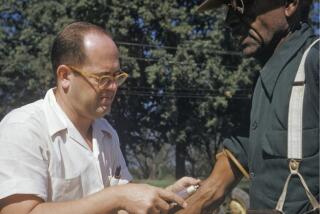Jurors’ Race Not Key to Simpson Verdicts, Most Say
- Share via
In a finding that indicates less of a racially tinged reaction to the O.J. Simpson verdicts than many might expect, a large majority of Americans do not appear to believe that the racial makeup of the juries was the key factor explaining why Simpson won his criminal trial but lost his civil case, a new Los Angeles Times poll has found.
Blacks and whites do continue to express different views about the verdicts, the poll found.
Among whites nationwide, 76% agree with this week’s civil case verdicts that found Simpson liable for the killings of Nicole Brown Simpson and Ronald Lyle Goldman. Only 16% of whites disagree.
Among blacks nationwide, only 25% say they agree with this week’s verdicts and 67% disagree. Among both races, most of those polled say they hold their views “strongly.”
But those racial feelings do not appear to have as strong an effect on people’s assessments of why the juries decided as they did.
When those polled were asked to name two “main reasons why there were two different verdicts” in the two trials, the racial makeup of the juries was cited in only 28% of the responses. The jury that acquitted Simpson in 1995 in the criminal case was largely black, while the civil case jury was mostly white.
The reason that was cited most often--in 32% of the responses--was the fact that a criminal case requires proof beyond reasonable doubt while a civil case requires only proof by a preponderance of the evidence, often described as being 51% or more likely to be true. Blacks and whites were about equally likely to cite the racial makeup of the jury as a key factor. Majorities of both races, however, cited combinations of other factors.
“If these statistics are accurate, then the American public, both white and black, is showing sharper analytical powers than have been attributed to them by the media’s preoccupation with race as the most important explanation for the different verdicts,” said UCLA criminal law professor Peter Arenella.
The findings in the current poll may indicate a shift of opinion in the 16 months since the criminal case ended. At that time, for example, a Newsweek poll showed that 60% of whites and 66% of nonwhites thought race was an important factor in the jury’s decision. The different wording of the two poll questions, however, makes a strict comparison impossible.
Both Arenella and New York University law professor Derrick Bell cautioned, however, that the results should not mask the continuing racial divisions that the Simpson case has highlighted.
“This case has been a watershed for racial hostility in this country,” Bell said.
Polls that seek to measure reactions on racial questions are always subject to some doubt, Bell said, because people are often reluctant to discuss race with strangers “and they push back some of their gut reactions.”
In addition to the differing burdens of proof, two other legal matters were among the most often cited reasons for why the juries acted as they did: the different evidence submitted in the two trials and the lawyers’ strategies.
The different evidence in the two cases included photographs that the civil case jury saw of Simpson wearing rare Bruno Magli shoes that matched those that left prints at the murder scene. In the criminal case, the jury heard testimony from LAPD Det. Mark Fuhrman, who was criticized for racial bias by both defense lawyers and prosecutors; Fuhrman did not testify in the civil trial.
In the poll, differing testimony was cited as a key factor 31% of the time, including 33% of the white responses and 22% of black responses. An additional 16% of the responses separately cited Simpson’s testimony--he testified at the civil trial, but not in the criminal case.
The differing strategies of the attorneys in the two cases came up in 20% of the responses, while 15% cited the fact that the criminal trial was televised and the civil trial was not.
The racial divide nationally on Simpson’s guilt is roughly the same as that found in a Times poll earlier this week among residents of Los Angeles. In the Los Angeles poll, 71% of whites said they believe Simpson committed the killings, while 70% of blacks said they believed he did not.
In the Los Angeles city poll, 47% of Latinos believed Simpson was the killer, while 26% said he was not. In the nationwide survey, the number of Latinos is too small to be separately analyzed.
The Times poll, supervised by acting Poll Director Susan Pinkus, surveyed 816 adults nationwide Wednesday and Thursday. The margin of sampling error is plus or minus 3 percentage points. The error rate is somewhat higher for subgroups.
Times staff writer Henry Weinstein contributed to this story.
(BEGIN TEXT OF INFOBOX / INFOGRAPHIC)
Why Two Outcomes?
Americans around the country cited the different standards of proof most often for the different decisions in the Simpson trials:
* Why do you think Simpson was found not guilty in the criminal trial but was held responsible for the killings in the civil trial?
*--*
(top five answers shown) All Whites Blacks Different standards of proof in the trials 32% 31% 42% Different evidence 31% 33% 22% Racial makeup of juries 28% 24% 29% Attorneys’ strategies 20% 22% 15% Simpson testified in civil trial, 16% 17% 16% not in criminal trial
*--*
Source: Los Angeles Times Poll
Note: Totals exceed 100% because more than one reply was accepted
(BEGIN TEXT OF INFOBOX / INFOGRAPHIC)
How the Poll Was Conducted
The Times Poll contacted 816 adults nationwide by telephone Wednesday and Thursday. The margin of sampling error for the entire sample is plus or minus 3 percentage points. Telephone numbers were chosen from a list of all exchanges in the nation. Random-digit dialing techniques were used so that listed and unlisted numbers could be contacted. The entire sample was weighted slightly to conform with census figures for sex, race, age, education and region. For certain subgroups, the error margin may be somewhat higher. Poll results can also be affected by other factors, such as question wording and the order in which questions are presented.
More to Read
Sign up for Essential California
The most important California stories and recommendations in your inbox every morning.
You may occasionally receive promotional content from the Los Angeles Times.














